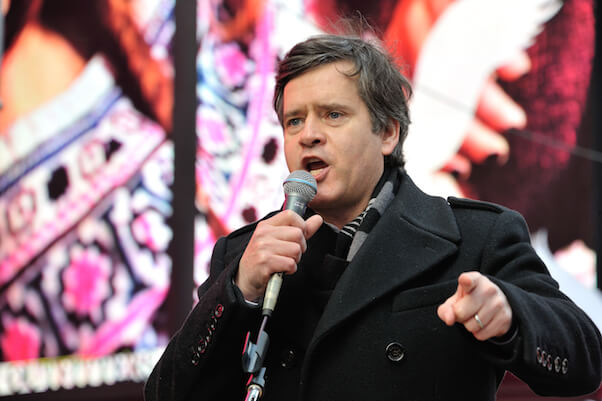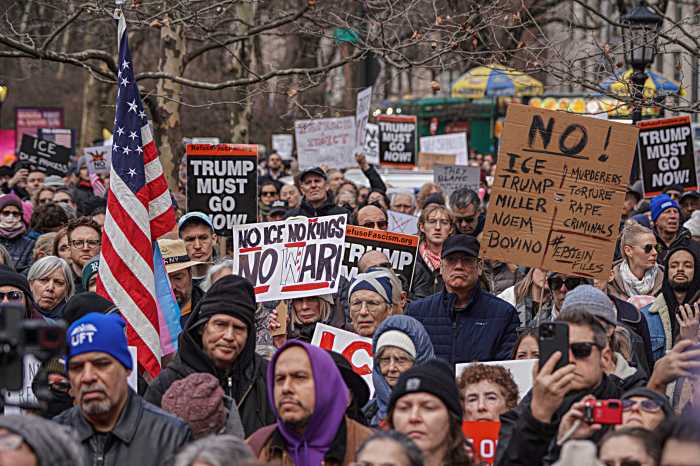BY DUNCAN OSBORNE | Responding to a complaint from 12 conservative members of Congress, 16 AIDS groups are the subject of a federal inquiry into their spending at the 14th International Conference on AIDS held in July in Barcelona.
And most of those groups protested a July 9 speech at the conference given by Tommy Thompson, the secretary of the Department of Health and Human Services (HHS), so some activists are charging the inquiry is payback for shouting down Thompson.
“There is an enormous concern about retaliation,” said Ana Oliveira, executive director of Gay Men’s Health Crisis, or GMHC. “This is retaliation from members of Congress. There is an intimidation kind of aspect to this.”
The inquiry started with a July 17 letter from the 12 members of Congress, all Republicans, to Thompson that alleged that the conference had an anti-religious bias and noted that the protesters had acted with “intolerance and discrimination toward you.”
They asked what was the “total amount of U.S. federal assistance” given to the conference and how many individuals from government and private groups “attended the conference with some form of federal assistance?”
In a July 17 e-mail to HHS, Roland Foster, a staffer on the House Subcommittee on Criminal Justice, Drug Policy and Human Resources, asked specifically about “funding levels” for GMHC, AIDS Project Los Angeles, the AIDS Vaccine Advocacy Coalition (AVAC), and the Treatment Action Group. Mark Souder of Indiana chairs that committee and he was one of the 12 representatives who wrote Thompson.
These were four of the 12 AIDS groups that sponsored the July 9 demonstration. In a July 23 e-mail, Foster added the remaining eight groups. He also included another four groups. It is unclear why Foster included the four who did not sponsor the protest. He did not respond to calls seeking comment.
It is likely that HHS will now write to each of the groups requesting documentation on how each one paid for their travel to the Barcelona conference, according to Tony Jewell, a spokesperson for the federal agency.
Some of the 16 groups cited in the congressional letter receive no federal funds.
“[The AIDS Vaccine Advocacy Coalition] does not receive any federal funds, so use of federal funds is not an issue in our case,” said Chris Collins, AVAC’s executive director.
Similarly, members of the Philadelphia and New York chapters of the AIDS Coalition to Unleash Power, or ACT UP, noted that group’s years-old tradition of refusing government support.
“My understanding is that they are investigating groups that receive federal funding which ACT UP doesn’t receive,” said Rob O’Brien, a member of ACT UP Philadelphia.
The groups have a number of responses to the inquiry ranging from a call to arms to a wait-and-see posture.
“I think there needs to be a discussion among the [AIDS service organizations] to commit themselves to do advocacy whenever necessary no matter what the government does,” said Mark Milano, a member of the ACT UP New York. He said the inquiry was meant to stifle dissent.
“It’s McCarthyism pure and simple,” Milano said. “The specter of fear makes people not do what they think is right. It’s absolute McCarthyism.”
Other groups are saying that the inquiry must not draw attention from more vital issues such as increasing AIDS funding in the federal budget.
“We do think that it’s important to watch this and we also think that it’s very important to continue in productive discussions with the secretary’s office and we think it’s extremely important that this not become a diversion,” said Anne Donnelly, director of public policy at Project Inform in San Francisco.
The politics of the inquiry are complicated. Gay and AIDS activist Michael Petrelis has made common cause with rightwing politicians, such as Souder, in charging that AIDS groups are wasting federal AIDS dollars. Rightwing groups such as the Traditional Values Coalition, the Family Research Council, and Citizens Against Government Waste have been claiming that there is vast fraud in federal AIDS spending. They inevitably point to programs that serve gay and bisexual men. The Congressmembers are certainly playing to those rightwing groups.
“This is originating with a very small number of very conservative congressman,” said Gustavo Suarez, communications directions at the San Francisco AIDS Foundation. “It is a silly distraction that is being orchestrated by a small group of ideologues. This does not seem to be something that is originating within HHS.”
While the Bush administration has tossed some political red meat on AIDS funding to rightwing groups, it has done it quietly. HHS audited federal spending at the Stop AIDS Project, a San Francisco group, earlier this year. The results of the audit were released to the press by someone on Capitol Hill. Other groups are being audited as well, and a second audit of Stop Aids, this time by the Centers for Disease and Prevention, also at the behest of conservative members of congress, is underway.
But, the Bush administration posture stands in marked contrast to the Reagan administration, which, in the late 1980s, publicly and aggressively attacked gay content in HIV prevention programs.
Some of the activists in the 12 groups fought those earlier battles as well.
“I think that within this administration they’ve got a complex coalition that they are trying to hold together,” said Terje Anderson, executive director of the National Association of People with AIDS. “Part of this coalition is the radical right. I think there are other people in the administration who are more moderate… I think there are struggles between them, but I think internally they are conscious of trying to keep those constituencies happy.”
The administration’s comments about the Barcelona spending inquiry seem aimed at projecting a subdued posture. Jewell, the HHS spokesman, said the agency was simply responding to a request from Congress.
“Members of Congress, whose names are on this letter, saw how the secretary was treated in Barcelona,” he said. “From our end that’s all it is. They requested information and we’re providing it. We can’t be accused of retaliating because members of Congress were concerned by what they saw in Barcelona.”
Activists have noted that after Thompson was shouted down in Barcelona he met for an hour with some of the same people who had protested his appearance.
“I think he was offended by the protest, but I think that through our conversation he was able to see that it wasn’t a personal protest aimed at him, it was a protest of the policy,” said GMHC’s Oliveira.
Thompson agreed to another meeting sometime this year.
Still activists are keeping a close eye on the inquiry.
“I don’t know the internal politics of the Bush administration here, but I think what is important here is how the administration responds,” said AVAC’s Collins. “I don’t see evidence that the administration is pursuing this. The measure of that will be whether or not they do anything beyond what is required of them by the congressional investigation.”



































